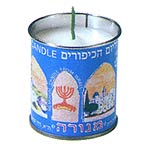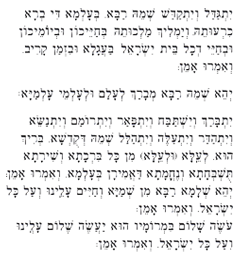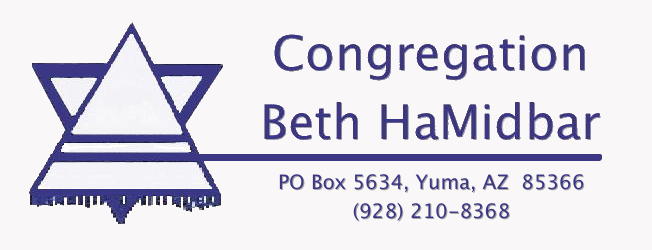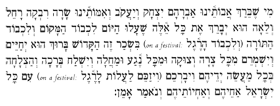Know how to sing the Birkat HaMazon? Lo? Then practice!
Uncategorised
Documentation
Radio station: WKLJ 1290 AM
Name: BDI18
2 Chr. 30:6
Helpful websites:
http://urj.org/cong/technology/websites/design/
http://helpsite.megillahserver.net (URJ helpsite)
http://docs.joomla.org (Joomla helpsite)
http://demo.joomla.org (Joomla practice)
http://pixabay.com (photos)
https://www.flickr.com/commons/ (photos)
https://www.joomlacontenteditor.net/support/documentation/56-editor (JCE Editor)
Website:
http://yuma.rjweb-builder.com/administrator
Desired URL: http://www.bethhamidbar.org
Email: bethhamidbar@gmail.com old
New: YumaSynagogue@gmail.com [name: Beth HaMidbar]
Congregation Beth HaMidbar
PO Box 5634
Yuma, AZ 85366-5634
Ph: (928) 210-8368 (answering machine)
Center for Spiritual Living
781 S. 2ND AVE.
Yuma, AZ 85364
Users:
– Public
– – Guest
– – Registered
– Administrator
– – Super User
Groups:
Attendees -> Members -> Board, Editor
Calendar:
Popup Note: Insert attribute: Class: jcetooltip / Title: note with <br> for line breaks. At end: <br><br><strong>Click for map</strong>
Map or other external URL: Insert link; URL: GoogleMap URL / Attributes:Target: Open in new window
Blank article
Blank article. Use this as a place holder.
Volunteer List
Willing to Serve in Positions
| Name |
Fund Raising |
Ritual |
Education |
Phone Tree |
Social Action |
Membership | Programming |
Host Oneg |
Host Havdalah |
Host Rabbi |
| X | ||||||||||
Blessings
Blessings
Blessing the Children
Place your hands on the child’s head and say:
For a boy:

Y’sim-cha Eh-lo-him k’Ephra’im v’chi-M’nasheh.
May God inspire you to live in the tradition of
Ephraim and Menasheh.
For a girl:
Y’si-meich Eh-lo-him k’Sarah, Rivka, Rachel, v’Lei-ah.
May God inspire you to live like Sarah,
Rebekah, Rachel, and Leah.
For both boys and girls:
Y’va-reh-ch’cha Adonai v’yish-m’reh-cha.
Ya-eir Adonai pa-nav ei-leh-cha vi-chu-neh-ka.
Yisa Adonai pa-nav ei-leh-cha v’ya-seim l’cha sha-lom.
May God bless you and keep you.
May God’s light shine upon you, and may God be gracious to you.
May you feel God’s Presence within you always, and may you find peace.
Content provided by the URJ
First Time Visitors
For First Time Visitors
PJTC welcomes students and other visitors, and we invite you to participate with us in our religious services. We hope this introduction will provide you with the information you need to understand, feel comfortable, and get the most from your visit.
PRAYER SERVICES AND BOOKS:
As Jews, we pray directly to God, without an intermediary such as a minister or priest. The Rabbi, meaning “teacher,” leads the services, announces which prayers are being said, provides explanations, and tells the congregants which prayers should be said while standing. If the Rabbi is unavailable, a lay member of the congregation will lead the services. The prayer books are written in Hebrew and have English translations for each prayer. Some books also have transliteration, i.e., Hebrew written in Roman letters. Since Hebrew reads from right to left, the books will appear to open from the wrong direction, but the pages are numbered so you will be able to follow the services.
TYPES OF SERVICES:
There are three types of services at PJTC each week, and you may attend any of them. While all services contain the same principle elements, there are some differences in the form and specific prayers. The Jewish Sabbath begins at sunset each Friday and concludes at sunset each Saturday. Therefore, the Sabbath services occur on Friday evening and Saturday morning. Visitors are encouraged to participate in the services, including the refreshments and/or meals following them.
Friday evening services begin at 8:00 PM, last 60 to 90 minutes, and are followed by an “Oneg Shabbat,” a reception starting with blessings over wine and bread, and continuing with refreshments.
Saturday morning services begin at 9:00 AM and last about 3 hours. The service is followed by the blessings over wine and bread, and refreshments or a buffet lunch in the Social Hall.
Sunday morning minyan is a service held from 9:00 to 10:00 AM. It is an opportunity for people to say the Mourner’s Kaddish, the special prayer recited on the anniversary of a loved one’s death, in the presence of the Jewish community.
CUSTOMS AND PRACTICES TO BE AWARE OF:
As in religious services of all faiths, there are certain customs and practices we follow. Most of them are required by Jewish law, and we appreciate your also observing them while at the Temple. (While you may be visiting in order to observe and learn, the synagogue is not a museum, and congregants are there to worship. Therefore, it may be offensive or disruptive if you do not respect the following.)
When attending services, please dress modestly (e.g., no mini skirts, short shorts, or sleeve-less blouses or shirts). Boys and men are asked to cover their heads as a sign of respect in the Sanctuary by wearing kippot (also known as yarmulkes or skullcaps). They are available in the foyer. Women may also wish to cover their heads, but it is not required. You’ll notice that Jewish men and some women wear a Tallit (prayer shawl) during services where the Torah is being read, but since that serves a religious purpose, non-Jews do not do so.
Observant Jews do not work, conduct business, or create anything during the Sabbath, observing it as a complete day of rest. Therefore, while in the Temple on the Sabbath, please do not write or take notes, use cell phones or other electronic devices, use a camera or take pictures, or smoke (actually, the entire synagogue is tobacco-free at all times).
SPECIAL NOTE FOR STUDENTS:
We understand that you may have an assignment to write a paper on what you observe and experience. Please wait until after you leave the Temple before you write down your observations. While you are at the Temple, feel free to ask the Rabbi, ushers, or congregants any questions about the services or Judaism. (Please remember that there is a wide range of knowledge and understanding about Judaism, and varying degrees of religious observance among Jews. Therefore, you may wish to clarify whether their answers reflect the personal beliefs and practices of the individuals you talk with, or whether they are universally accepted within Judaism.) The web site myjewishlearning.com is especially useful in getting explanations and obtaining information about Judaism.
SPECIAL NOTE FOR CLASSES OR GROUPS:
When you call the office, please let them know you’d like to attend as a group. If possible, we’ll arrange for someone to talk with the group after the services, to provide additional information about the Sanctuary and Judaism, and to answer questions.
Confirmation
Confirmation is a somewhat less widespread coming of age ritual that occurs when a child is 16 or 18. Confirmation was originally developed by the Reform movement, which scorned the idea that a 13 year old child was an adult (but see explanation below). They replaced bar and bat mitzvah with a confirmation ceremony at the age of 16 or 18. However, due to the overwhelming popularity of the bar or bat mitzvah, the Reform movement has revived the practice. I don’t know of any Reform synagogues that do not encourage the practice of bar and bat mitzvahs at age 13 today.
In some Conservative synagogues, however, the confirmation concept has been adopted as a way to continue a child’s Jewish education and involvement for a few more years.
Yahrzeit
 You are invited and encouraged to let us know the name and yahrzeit of your beloved ones who have departed from us. We will honor their memory by announcing their name at our synagogue during services. May you be comforted among all the mourners of Israel.
You are invited and encouraged to let us know the name and yahrzeit of your beloved ones who have departed from us. We will honor their memory by announcing their name at our synagogue during services. May you be comforted among all the mourners of Israel.
In Jewish tradition, when the year of mourning is over, mourners are expected to return to a fully normal life. There are several occasions each year when our loved ones who have passed on are memorialized. The most significant of these is yahrzeit, the anniversary of the death, which is observed according to the Hebrew calendar. As is the case in all Jewish holy days, yahrzeit observance begins at night. A 24-hour candle is lit and one may attend synagogue to recite the Kaddish [the memorial prayer]. It is traditional to avoid attending any celebrations or parties on the day of yahrzeit, and some people fast on that day.
|
MOURNER’S KADDISH Yit-ga-dal v’yit-ka-dash sh’mei ra-ba, b’al-ma di-v’ra chi-ru-tei, v’yam-lich mal-chu-tei b’chai-yei-chon uv’yo-mei-chon uv’chai-yei d’chol-beit Yis-ra-eil, ba-a-ga-la u-viz-man ka-riv, v’im’ru: Amen. Y’hei sh’mei ra-ba m’va-rach l’a-lam ul’al-mei al-ma-ya. Yit-ba-rach v’yish-ta-bach, v’yit-pa-ar v’yit-ro-mam v’yit-na-sei, v’yit-ha-dar v’yit-a-leh v’yit-ha-lal, sh’mei d’ku-d’sha, b’rich hu, l’ei-la min kol bir-cha-ta v’shi-ra-ta, tush-b’cha-ta v’ne-che-ma-ta, da-a-mi-ran b’al-ma, v’im’ru: Amen. Y’hei sh’la-ma ra-ba min sh’ma-ya, v’cha-yim, a-lei-nu v’al kol-Yis-ra-eil, v’im’ru: Amen.. O-seh sha-lom bim-ro-mav, hu ya-a-seh sha-lom a-lei-nu v’al kol-Yis-ra-eil, v’im’ru: Amen.
An English Translation Glorified and sanctified be God’s great name throughout the world which He has created according to His will. May He establish His kingdom in your lifetime and during your days, and within the life of the entire House of Israel, speedily and soon; and say, Amen. May His great name be blessed forever and to all eternity. Blessed and praised, glorified and exalted, extolled and honored, adored and lauded be the name of the Holy One, blessed be He, beyond all the blessings and hymns, praises and consolations that are ever spoken in the world; and say, Amen. May there be abundant peace from heaven, and life, for us and for all Israel; and say, Amen. He who creates peace in His celestial heights, may He create peace for us and for all Israel; and say, Amen. May they rest in peace and may their memory ever be for a blessing… At this moment, I pause for thought in memory of my beloved……………………… |
I give thanks for the blessing of life, of companionship and of memory. I am grateful for the strength and faith that sustained me in the hour of my bereavement. Though sorrow lingers, I have learned that love is stronger than death. Though my loved one is beyond my sight, I do not despair for I sense my beloved in my heart as a living presence. ustained by words of faith, comforted by precious memories, we kindle the light in remembrance. “The human spirit is the light of Adonai” (Proverbs 20:27). As this light is pure and clear, so may the blessed memory of the goodness and nobility of character of our dear…………..illumine our souls. May they rest in peace and may their memory ever be for a blessing… At this moment, I pause for thought in memory of my beloved………………………I give thanks for the blessing of life, of companionship and of memory. I am grateful for the strength and faith that sustained me in the hour of my bereavement. Though sorrow lingers, I have learned that love is stronger than death. Though my loved one is beyond my sight, I do not despair for I sense my beloved in my heart as a living presence. ustained by words of faith, comforted by precious memories, we kindle the light in remembrance. “The human spirit is the light of Adonai” (Proverbs 20:27). As this light is pure and clear, so may the blessed memory of the goodness and nobility of character of our dear…………..illumine our souls. |
 Click to enlarge. Click to enlarge. |
Healing
We invite you to send us the name(s) of loved ones who are facing the challenge of illness, that we may support them, and you, by inclusion in our communal Mi Sheberakh prayers.
The Mi Sheberakh prayer is one of the central Jewish prayers for those who are facing the challenge of illness. The pray includes pleas for both physical and spiritual healing within the community of others facing illness. Traditionally, the Mi Sheberakh is said in synagogue when the Torah is read. In modern times, the Mi Sheberakh is often said by professional health caregivers, patients, and loved ones at various times during treatment and recovery from illness of all sorts.
Avoteinu: Avraham, Yitzhak, v’Yaakov,
v’Imoteinu: Sarah, Rivka, Rachel v’Leah,
Hu yivarekh virapei
et haholeh/haholah _____ ben/bat ______
HaKadosh Barukh Hu
yimalei rahamim alav/aleha,
l’hahalimo/l’hahlimah,
u-l’rap’oto/u-l’rap’otah,
l’hahaziko/l’hazikah,
u-l’hay-oto/u-l’hay-otah.
V’yishlah lo/lah bim-hera
r’fuah shlemah,
r’fu-at hanefesh u-r’fu-at hagoof,
b’tokh sh’ar holei Yisrael v’holei yoshvei tevel,
hashta ba’agalah u-vizman kariv,
v’no-mar, Amen!
Patriarchs Abraham, Isaac, and Jacob,
Matriarchs Sarah, Rebecca, Rachel, and Leah
bless and heal the one who is ill:
__________ son/daughter of _________.
May the Holy Blessed One
overflow with compassion upon him/her,
to restore him/her,
to heal him/her,
to strengthen him/her,
to enliven him/her.
The One will send him/her, speedily,
a complete healing —
healing of the soul and healing of the body
along with all the ill,
among the people of Israel and all humankind,
soon, speedily, without delay,
and let us all say: Amen!
{component url=’index.php?option=com_phocaguestbook&view=phocaguestbook&id=1′}


